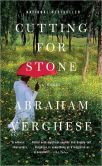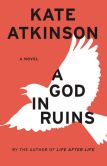— from MaurineTalksBooks.com —
Like so many of you, I particularly treasure the long, languid summer days here in the northern latitudes. Daylight comes as early as 4am, and lingers until around 10pm. Perfect weather for savoring the long novels I have been meaning to read all year. Sometimes I read outside in the garden, sometimes on my bed with the windows open and a sweet breeze flowing through. The author must sweep me into another world, where it doesn’t matter how long it takes me to finish and I am sad when I finally have to leave.
 Cutting for Stone, by Abraham Verghese
Cutting for Stone, by Abraham Verghese
This has to be one of a very few all-time favorites–both the book and the author. An unlikely, and hardly believable event starts this emotionally thrilling novel, set in an Ethiopia at the brink of revolution. Conjoined twin boys are born to a mother (an Indian nun!) who dies in childbirth, and a father (a hard-headed British surgeon) who abandons them. Marion and Shiva are brought up in a family of doctors who adopt them: both are drawn toward medicine, and to the same woman, which sets events in motion for Marion that he cannot control. After medical school, and upon finding that his brother has betrayed him with the woman he’d hoped to marry, he flees to the United States, finding work where he can get it -– in an overcrowded, understaffed New York hospital. In time, Marion’s past catches up with him, and he finds he must confront the two people who damaged him most -– -his father, who left him and his brother, who betrayed him. I have listened to this book on CD, AND read it in paper form. It is that memorable, that vivid, and deserves the very wide acclaim it has received since it was published in 2009.
 Anna Karenina, by Leo Tolstoy
Anna Karenina, by Leo Tolstoy
Who hasn’t read Anna? But who has not read Anna in the summer, taking one’s time, reading it with fresh eyes for the second, third or fourth time? That is the beauty of this classic: it holds up so solidly even after multiple readings. I often overhear people say they are reading this Tolstoy classic, and others almost swoon with envy: “I want to read it again” or “What a treat!” or “I just finished it–for the second time”. I need hardly say that this is “the” love story–thrilling, engrossing, tragic and all the other words that describe passionate and doomed love. Anna leaves her staid marriage when she falls in love with the dashing Count Vronsky, and suffers the consequences of society’s disapproval to a degree she did not anticipate. There are a number of translations, and my personal preference is the Pevear/Volokhonksy version (shown here, with an unusual cover). The depth of Russian history and culture that provides the warp and weft for this story clearly elevates it above other long novels, even other classics. I plan to go for a third reading by August.
 A God in Ruins, by Kate Atkinson
A God in Ruins, by Kate Atkinson
I loved Atkinson’s Life After Life, which I have recommended to friends and family since it was published in 2013. This is Atkinson’s “follow-up” novel, focusing this time on Teddy, the younger brother of Ursula, (the central character in Life). It is not necessary to read the other novel first, however. This is a strong, stand-alone story. Teddy is a poet and RAF fighter pilot in WWII who barely survives (fewer than half of England’s RAF pilots survived the war), to become a husband, father and grandfather. Atkinson is a master at manipulating time (and sometimes reality) in her books; in this story she illustrates the damage of war and resiliency of humans who survive repeated trauma. There is a publisher’s quote that deftly describes the theme of this book: “his greatest challenge would be to face living in a future he never expected to have”. Particularly engaging is Teddy’s caustic and challenging daughter Viola, and his relationships with his two grandchildren. But it is difficult to single out one thing that makes this novel so excellent. It was all exceptional.
**If you are reading theOrcasonian for free, thank your fellow islanders. If you would like to support theOrcasonian CLICK HERE to set your modestly-priced, voluntary subscription. Otherwise, no worries; we’re happy to share with you.**







